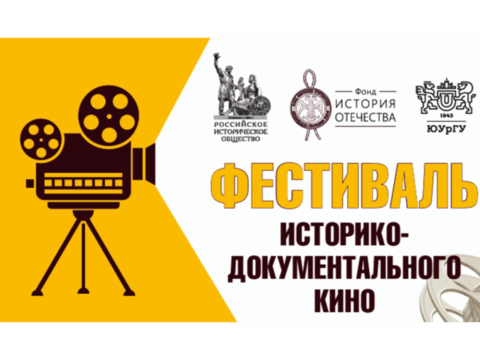The Historical Documentary Film Festival of the Russian Historical Society with the support of the History of the Fatherland Foundation will be held in Chelyabinsk on November 26th. Among the festival organizers is South Ural State University (National Research University), which is the major university in our region and one of the major universities in our country. Films created by prominent Russian documentary filmmakers will feature there. The festival will be opened by the film Memory of Generations (“TV-Novosti”), the screening will be organized in the SUSU Activity Hall. The film is dedicated to the events which happened 80 years ago, when a bridgehead to liberate all of Ukraine from the Nazis was created in Donbass. And today, right now, the fate of Donbass is being determined, on which the outcome of the entire Russian military operation largely depends. Veterans who lived during the occupation and liberated Donbass, as well as heroes who defended it from modern Nazis for eight years have taken part in the film. Moreover, the film will show the sites where memorable battles and fights took place, will tell about the special genome of courage in Donbass, and most importantly, how Nazism during the Great Patriotic War is similar to Nazism in modern Ukraine.
Then, meetings with authors of the films will take place at other venues.
A meeting with the authors of the film War through the Camera Lens, which is dedicated to the fate and heroic deed of the Soviet front-line cameramen during the Great Patriotic War, is organized for journalists. The film was created by the Culture of Nations Media Holding. Shooting took place in three countries that became sovereign with the collapse of the USSR: Russia, Estonia and Uzbekistan. The film contains unique material about the fates of people who showed the world the face of fascism and what it leads to together with national hatred. Kayumov, Sokolov and Shkolnikov are the only Soviet front-line cameramen who lived to see the 65th anniversary of the Victory in the Great Patriotic War. They did not divide winners by nationality and were certain that the multinational people of the great country won.
The film Prophet of the Empire (Tolstoy) from the “Imperial Portraits” cycle of the “Who Are We?” Felix Razumovsky's original program will be screened for philology students. The portrait of a great man, a national genius, reflects the era in which the great writer, whose works are worldwide famous, created and which he immortalized. The film contributes to strengthening of the spiritual and moral values of Russians and their historical education.
History students will have a chance to talk with the authors of the film At the Origins of Russian Archaeology.
The film is dedicated to Aleksey Uvarov, one of the founders of Russian archaeological science, the discoverer of archaeological cultures and monuments, and creator of the State Historical Museum. Unlike his father, who had built a career of a statesman, he chose the path of a scientist. Count Uvarov’s contribution to the formation and development of archaeology and historical science is significant. The film presents the results of Count Uvarov’s work: his publications, finds from his archaeological work, items from his family collection, and his main achievement: the exhibit in the State Historical Museum.
Future lawyers will be able to watch the film Waging an Invisible Battle by the Lenfilm studio. It tells about the activities of the police in pre-war and wartime Leningrad. The story is told on behalf of the police officers who went through all the trials of the siege, who entered into battle with saboteurs, deserters and criminals. The film also reveals such pages of the life of the siege police as the fight against speculation and the “fifth column”, the connection of criminal groups with the fascists, the disclosure of crimes related to the abuse of office and the forgery of bread cards. At the same time, the police officers did their best to maintain a healthy spirit in the city and provided all possible assistance to the population.
The film My War. Liberation of Europe: Germany created by the Education in the Third Millennium Interregional Public Foundation will be presented to students of the Institute of Linguistics and International Communication. The film is dedicated to the 80th anniversary of the beginning of the liberation of Germany from fascism by the Red Army. It was the Workers' and Peasants' Red Army that crossed the state border of the Soviet Union and entered Europe besieged by the Nazis on May 1, 1944. Then Europe, exhausted by the war, was looking forward for the long-awaited Peace. The films contain living testimonies of veterans of the Great Patriotic War. Their stories preserve the unique atmosphere of a bygone era, the freshness of the living word and the simple soldier's Truth.
The festival will also be hosted by the Chelyabinsk Institute of Culture, where a meeting with the author of the film Rachmaninoff. Bell Ringing of the Russian Soul will take place. Students serving the arts and culture will be able to appreciate this work. The film was prepared for the 150th birthday anniversary of the great Russian composer, pianist and conductor Sergei Rachmaninov. The film tells about the composer's eventful life, his creativity and endless talent. Sergei Rachmaninoff was strongly influenced by the revolutionary years in Russia, when life was divided into the before and after. Not accepting the Soviet power, he went abroad, where he continued his creative work. In Europe and the USA, he tried to create Russia around himself: he communicated with Russians, provided financial assistance to distressed compatriots and called on other emigrants to do the same. His music has power, beauty and grandeur, it glorifies the sacred Motherland that Rachmaninoff loved so much.




